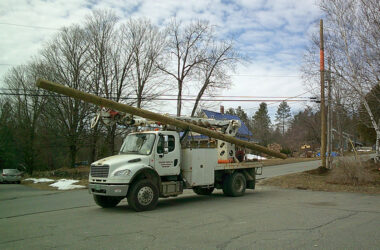
The Honeybee Steelband played at the Pollinator Festival held June 18 during the Hardwick Farmers’ Market. Pictured (from left): Jessamine Stone, Emily Lanxner, Keith Gibson, Laura Rappold and Henry Kasulka.
by Paul Fixx
HARDWICK – As Greensboro gets ready to consider a Town Meeting Day article 14, proposed by Jane Hoffman, declaring itself a “pollinator-friendly” community and the Vermont Legislature considers H.706, a bill banning neonicotinoid use in Vermont, local activist Emily Lanxner and Rep. Chip Troiano may be seeing their efforts come to fruition.
Lanxner first became interested in protecting pollinators in 2014 when she linked personal health issues with chemically treated corn fields while living in Illinois. She says, “The more I read about the problems that pollinators were facing, the more I came to realize that this was a problem of existential proportion, endangering the food supply of our entire planet. It seemed like not enough people were paying attention, so I decided that despite the serious nature of dozens of other existential threats and calamities around the world, I would be most effective if I focused on just one issue, protecting pollinators, and I set out to make a difference.”
Through her music Lanxner introduced a “Save the Bees” message. In 2015, she led a group of kids, all dressed as bees, in Hardwick’s spring festival parade playing a popular tune called “All About the Bass”, but changed the title to “All About the Bees”. She says, “At that time, I thought the biggest problem was the glyphosate pesticide, the primary ingredient in RoundUp. Further research revealed that another class of pesticides, called Neonicotinoids, was exponentially worse for bees.”
The Xerces Society for Invertebrate Conservation states, “Neonicotinoid insecticides are now the most widely used class of insecticides in the world. While they were initially introduced as less harmful than older insecticides, research has now shown their devastating ecological impacts. Neonicotinoids are very toxic to pollinators, beneficial insects, and aquatic invertebrates. Their widespread use, combined with their water solubility, means that they are now often found in water and soil samples throughout the country.”
A year later Lanxner’s band became the Honeybee Steelband and added several professional musicians to the roster. They performed “A Taste of Honey” in the Hardwick parade, ending with a demonstration at Aubuchon Hardware, where they buzzed around in bee costumes and offered honey sticks in exchange for taking toxic pesticides off the shelf. Soon after, she reached out to other concerned community members to organize an educational forum at the Jeudevine Library, where we screened a film about colony collapse disorder. She invited local legislator, Rep. Chip Troiano to let him know about the issue.
Troiano recalls; “I think it was 2017 [when] Emily Lanxner and others from Hardwick and elsewhere asked me to sponsor a bill that would protect our pollinators which were dying at alarming rates. I recall the first meeting at the library in Hardwick when I first became aware of Neonicotinoid pesticides. From there I did a ton of research and found that one of the worst offenders was a particular pesticide used in commercial garden sprays. I found that large bottles of the stuff, with pictures of rose bushes on the label and a caption that said ‘Make Your Roses Beautiful’ were readily available on the shelves of our hardware stores.
“One of the main ingredients was neonicotinoid. I found that a few sprays of it could kill literally thousands of pollinators. Armed with this information, I filed a bill that would ban the commercial sale of this toxic substance.”
That year, Lanxner’s Honeybee Steelband hosted the first ever Pollinator Festival in the region, with kid-friendly pollinator activities led by Jerry Schneider, a beekeeper demonstration by Todd Hardie, and a legislative strategy discussion led by Lt. Governor David Zuckerman, Rep. Chip Troiano, and Judy Bellairs, then living in Hardwick, from the Sierra Club.
Troiano’s bill lingered in the House Agriculture Committee until it was taken up by then- Chair Partridge. It met with some resistance from seed manufacturers. Troiano comments, “Our side was not organized enough to get it across the finish line.”
The next session Troiano filed a better bill and engaged Belairs and some others to help champion it.
“We went to the Gund Institute at UVM for research data and we got our forces together. There was a piece of that bill that would have made untreated seeds more available to our farmers. That portion was not going to make it, so the committee removed it from the bill. What moved forward was the first bill to take commercial neonicotinoid off the shelves of our hardware stores. With a great deal of promotion around the House and about 40 co-signers we moved the bill through all committees it visited unanimously in both chambers. And it was signed into law by the governor in 2019.”
Lanxner comments that, “This bill banned the retail sale of neonic pesticides. It was a step forward, but only covered a tiny percentage of the highly toxic level of neonicotinoid use in Vermont.”
Troiano continues, “From that time we have been trying to take corn and soybean seeds treated with neonicotinoids off the market. The bill is still moving forward at this time with Rep Chestnut-Tangerman as lead sponsor and me as co-sponsor [with many others]. Unfortunately seed companies are still fighting it. We find that. with only treated seeds available, farmers do not know if they really enhance crop yields. If this bill passes we will take another step in protecting pollinators. Because we know [that] without pollinators, we have no food, vegetables, or fruits. That is most of my involvement in this [effort] and it moved forward with the support from our own town of Hardwick.”
Greensboro resident, Clive Gray’s 14-year old grandson, Zoryan Ivakhiv-Gray, has joined with others in town to offer information about creating wildflower gardens and pollinator corridors. In support of the H.706, Ivakhiv-Gray writes, “In areas where neonicotinoids have already been banned, like the EU, Quebec, and more recently New York, there has been no decrease in crop yields. In Quebec, where there has been a 99.5% reduction in neonic use over a five-year period, there was no observable decrease in crop yields. The five-year period of transition between now and 2029 will give farmers the time they need to shift away from pesticides, so there will probably not be a sudden negative impact. In the long term, losing our birds and pollinators and poisoning ourselves will be much worse than the likely 0% loss in crop yields.”
The bill has been passed out of the House Committee on Agriculture, Food Resiliency, and Forestry with a minor amendment and is now being considered by the House Ways and Means Committee.
Lanxner reports, “In 2023, I had the opportunity to attend an international symposium of indigenous beekeepers and activists in Nicaragua, so I am starting to learn about engaged activism with this issue on a global level. Later in 2023, I started training to become a radio programmer, so that I could host a monthly radio show called “The Pollinator Report”, a news show that focuses on recent legislative efforts to protect pollinators, as well as discussions about pollinator habitat and other global initiatives concerning pollinators. It now airs on Central Vermont Community Radio every third Saturday from 9 to 10 a.m.
Ivakhiv-Gray, showing great concern for Vermont’s pollinators, says he “hopes that Greensboro’s Town Meeting will vote to make the town pollinator-friendly. I urge everyone to contact their legislator about how important it is to pass H.706.”
Paul Fixx is editor of The Hardwick Gazette and lives in Hardwick.








